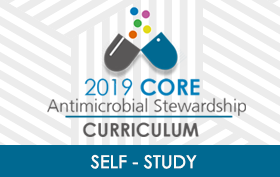
Section 4: Antimicrobial Stewardship Program Logistics (Self Study for medical students)
Content in this section is available through 2 activities.
Activity One | “Shortage Mitigation of Antibiotics in Real Time (SMART)” Exercise |
The first activity is an antibiotic shortage simulation exercise entitled “Shortage Mitigation of Antibiotics in Real Time (SMART)”.
You should prepare for the shortage exercise by researching the SMART preparation questions. You can access the questions and brief primer via the SMART Exercise Preparation eLearning module.
You must complete the pre-recorded "SMARTcast Exercise", recorded at IDWeek 2018 to receive credit for this exercise. If faculty resources are available, it is optional to complete the second eLearning "Section 4: Antimicrobial Stewardship Program Logistics - SMART Exercise eLearning" as a team/group.
Activity Two | "Reflective Observation, Brief Interview, and Notation (ROBIN)" Exercise |
The second activity in this section is the "Reflective Observation, Brief Interview, and Notation (ROBIN) exercise".
For this component of the curriculum, you will prepare for the exercise with a brief primer on medical staff governance using the eLearning module. You should then plan to either attend 2 leadership activities (such as AS or Infection Prevention meetings) or interview 2 medical staff leaders at your home or a neighboring institution.
Next, you should complete the exercise by preparing a one-page write up of your impressions.
If you have trouble finding resources to help complete this activity, please e-mail [email protected] for further assistance.
Target Audience
Infectious Diseases professionals and others who desire to learn more about antimicrobial stewardship but are not in a participating fellowship program, no longer in fellowship, or would like to gain more knowledge on the subject.
Learning Objectives
Upon completion of this section, you will be able to:
- Describe key steps in establishing an ASP
- Identify multidisciplinary collaborations necessary for the success of an ASP
- Describe how to implement the core elements of ASPs into practice
- Recognize regulatory and reporting aspects of ASPs
- Describe AS quality improvement and patient safety activities
- Recommend strategies for responding to antimicrobial shortages
NOTE: Because this curriculum was initially designed specifically for fellows, you may hear/see repeated reference to "fellows" ,"stewards in training" or "fellow/trainees".
AS Curriculum Workgroup COI Summary Reviewed April 2017 by Rachel Simmons, MD No conflicts found
| Name | Individual's Role in Activity | Name of Commercial Interest | Nature of Relationship |
|---|---|---|---|
| Abbo, Lillian | Workgroup member | Pfizer Brazil | Honoraria |
| Advani, Sonali | Workgroup member | Nabriva Therapeutics | Advisory/Consultant Role |
| Amstrong, Wendy | Workgroup member | None | |
| Barsoumian, Alice | Workgroup member | None | |
| Beeler, Cole | Workgroup member | None | |
| Bystritsky, Rachel | Workgroup member | None | |
| Cherabuddi, Kartik | Workgroup member | Gatorade | Start - up Research Fund |
| NIH (Medimmune) | Research Grant | ||
| Cohen, Seth | Workgroup member | None | |
| Hamilton, Keith | Workgroup member | None | |
| Ince, Dilek | Workgroup member | Ansun Pharma | Research Grant |
| Justo, Julie Ann | Workgroup member | None | |
| Logan, Ashleigh | Staff | None | |
| Luther, Vera | Workgroup member | None | |
| Lynch, John | Workgroup member | Astellas Pharmaceuticals, Juno Therapeutics | Advisory/Consultant Role |
| Nori, Priya | Workgroup member | None | |
| Ohl, Christopher | Workgroup member | Paratek, Bayer, Cempra Pharmaceuticals | Advisory/Consultant Role |
| Patel, Payal | Workgroup member | None | |
| Pottinger, Paul | Workgroup member | McGraw Hill, Elsevier | Honoraria |
| Schwartz, Brian | Workgroup member | None | |
| Spicer, Jennifer | Workgroup member | None | |
| Stack, Conor | Workgroup member | None | |
| Zhou, Yuan | Workgroup member | None | |
| Shnekendorf, Rachel | Staff | None |

 Facebook
Facebook X
X LinkedIn
LinkedIn Forward
Forward